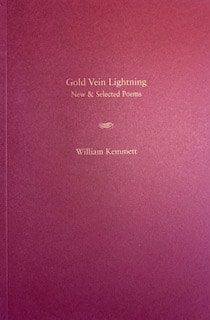

A Review of Sighting Icarus, by Richard Martin
By Sophia G. Kidd
Sighting Icarus (Buy this Book)
Poems by Richard Martin
Igneus Press, 2020, 24 pages
18 poems all-up; we begin with ‘Flight Check’ and end with the book’s title poem, ‘Sighting Icarus.’ Each poem, with its calculus of moon and star, of unknown and thought, performs a light structure; stanzas of two to four lines, one to four stanzas per poem. Externalized thought is combined with internalized image to wrest from inwardly the readers’ insight and delight; as in “Instant Metaphysics”: “The indelible delicacy/ of the unknown/ haunts being.” We see the unknown as something delicate, a possibility of love; as in “Preparation”: “Love embraces the unknown/ to become whole.” Perhaps love is that which dares to break the chain between cause and effect, to attend to life as bees do, in “Lovers”: “Lovers light amid flowers./ Bees approve, buzzing/ mindlessly.”
Richard Martin is a philosophical poet, and we begin mid-air, in-flight, already on the journey of life. First image placed on the altar of our experience are thoughts, themselves: “I’m strangely happy./My thoughts are wax replicas of the unknown./At night, I burn them for heat and light.” In the pantheon of Martin’s poem, life is separate from our thoughts of it; as consciousness tends the fire of psychic night, burning day’s thoughts for fuel enroute through astral dream-scape. One expects his flight to be through the fantastic, the Empyrean of all space and time; but it is not. The author, weightless, confines himself to the humble space of his own home: “Nothing weighs me down./ I soar through the house/ without notice.”
“Splash” rolls out philosophical value and color: ontology: “I’m inside myself”: the mathematically planar being of numbers through which our experience turns: “rotating in a plane/ of numbers”; time: “We’ll meet at the end of time,/ that’s what you say,” as if self and other could ever resolve in time; identity and reflection: “There are no mirrors/ to guide us, reflect/ who we are”; and finally stars which fall to earth, into “ponds of recognition.” Then in the next poem, “Beach Stroll,” we are launched by the first line into a consideration of sitedness: “We think we’re here, / believing in the substantiality/ of thought.” Again, thought and substance, mind and body, Cartesian exploration into the nature of existence among elements which fall and reflect, among rules and laws of being outside of time, inside of number. However we must never think that Martin’s poems serve philosophy first. He serves, above all, the image; as in the second stanza of “Beach Stroll”: “The ocean is slate gray/ with a white mustache of waves / that extends for miles,” a taste of the poet’s maritime and spatial awareness.
One may wonder what such pure speculation on the nature of day and night, stars and ponds, love and thought, the unknown and the mindless has to offer us in a time of tumultuous social change and political deception. Where’s the activist in this poet? What’s the philosopher got to do with us today? The activist is the poet who believes in de-territorializing the world of our mind, in wresting that which is mapped from the hands of ideology, of cartographers who rape and pillage not only earth, but our sense of being on it. The activist is in the philosopher who reopens the gap between self and poem, between language and thought; so that real choice may arise, and image may strike root in our soul. We end with “Option” in its entirety, which performs this revolutionary labor:
“Some retire into loneliness
after long and arduous journeys.
Others praise the sun,
the way it melts the sky
into a feast of colors.”
Other images and concepts in Sighting Icarus include the best ‘capture’ of daybreak over the sea I have read in any language, from any period of time, in “From a Window.” Martin’s ability to merge his body of lived experience with words is uncanny. While this poet is known for his humor and wit, this book is serious; devoted to a sadness which leads to promised daybreak, as: “The dark sea braces for light.”
An pure example of the Igneus aesthetic, this chapbook, as with the other three in the White Quartet series, is published on white paper and card stock cover; title, byline and publisher’s masthead in Times New Roman black ink. This aligns with Igneus founder and late publisher Peter Kidd’s preference for ‘a clean aesthetic’ with nothing obscuring the poetry.
About the White Quartet series: Sighting Icarus is the latest and third in a four book chapbook series designed by the author and late Igneus Publisher, Peter Kidd. The first in the series, Hard Labor, came out in 2019, with Cosmic Sandbox released later that year. Richard Martin has dedicated Sighting Icarus “In Memoriam Peter Kidd,” a moving gesture in nod to decades of love and friendship. The final book in this series, Hobo Return, will be published with Igneus in early 2021.
About the Author: In addition to the White Quartet series, Richard Martin has also published Strip Meditation (2009) with Igneus Press. Other Martin titles include: Ceremony of the Unknown (Spuyten Duyvil, 2020), Dream of Long Headdresses: Poems from a Thousand Hospitals (Signpost Press, 1988), White Man Appears on Southern California Beach (Bottom Fish Press, 1991); Modulations (Asylum Arts, 1998); Marks (Asylum Arts, 2002); boink! (Lavender Ink, 2005), Sideways (Obscure Publications, 2004), Altercations in the Quiet Car (Lavender Ink /Fell Swoop, 2010), Under the Sky of No Complaint (Lavender Ink /Fell Swoop, 2013) Fungo Appetite (unarmed chapbooks, 2014), Buffoons in the Gene Pool (Lavender Ink /Fell Swoop, 2016), and Techniques in the Neighborhood of Sleep (Spuyten Duyvil, 2016). Martin is a past recipient of a National Endowment for the Arts Literature Fellowship for Poetry, founder of The Big Horror Poetry Series (Binghamton, New York, 1983-1996) and a retired Boston Public Schools principal. He lives in Boston with his family.
SUBSCRIBE
